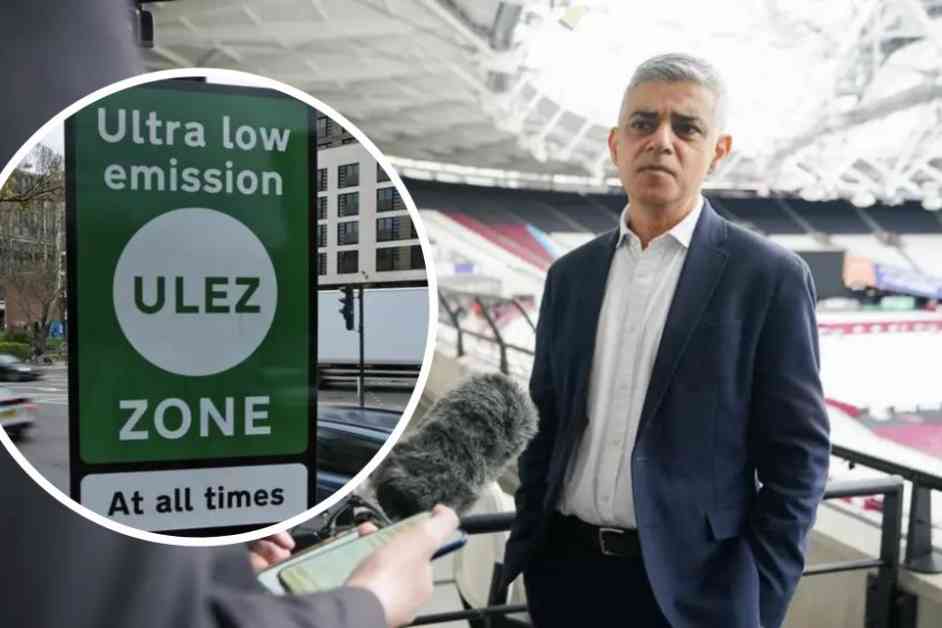Sadiq Khan, the Mayor of London, has made the decision to close London’s ultra low emission zone (Ulez) scrappage scheme in three weeks, with the programme set to stop accepting new applicants on September 7. This move comes after the scheme was expanded last year to include all of London’s residents, sole traders, small businesses, and charities. The decision to close the scheme was made as applications have significantly decreased in recent weeks, with more than 96% of vehicles in London now complying with Ulez standards.
The Ulez scrappage scheme was introduced to encourage Londoners to switch to cleaner, greener vehicles by offering grants to those who own vehicles that do not meet minimum emissions standards. The grants are worth up to £9,000 for minibuses, £7,000 for vans, £2,000 for cars, and £1,000 for motorbikes. In addition to cash incentives, some vans and minibuses are eligible for retrofitting with emissions abatement equipment.
Since its inception in January last year, the scrappage scheme has committed over £186 million to nearly 54,000 applicants. The total budget for the programme is £210 million, and City Hall has stated that any remaining funds will be considered for other proposed uses to further the Mayor’s transport strategy once the scheme closes.
Despite the closure of the Ulez scrappage scheme, Mayor Sadiq Khan remains committed to improving London’s air quality and encouraging sustainable transport. He expressed pride in the scheme’s success in supporting Londoners to transition to cleaner vehicles and highlighted the positive impact of Ulez compliance, which has now reached more than 96% in the city.
In an effort to continue supporting Ukraine in its conflict with Russia, more than 330 vehicles have been donated through the Ulez scrappage programme. Mayor Khan has promised additional funding to ensure that vehicles can still be donated to Ukraine even after the scheme concludes.
Christina Calderato, Transport for London’s director of strategy, acknowledged the enthusiastic uptake of the scrappage scheme by Londoners. With nearly 54,000 applications approved and the majority of those needing support having already taken action, demand for the programme has decreased. Calderato encouraged anyone still in need of assistance to submit their application before the September deadline.
Most vehicles that do not meet minimum emissions standards and are not exempt from Ulez requirements are subject to a daily fee of £12.50 for entering the Ulez area. Petrol cars are generally required to have been first registered after 2005 to meet the Ulez standard, while most diesel cars must have been registered after September 2015 to be exempt.
Impact of the Ulez Scrappage Scheme
The Ulez scrappage scheme has had a significant impact on reducing emissions and improving air quality in London. By incentivizing the transition to cleaner vehicles, the programme has contributed to the city’s efforts to combat pollution and promote sustainable transport options.
The success of the scrappage scheme is evident in the high level of Ulez compliance among vehicles on London’s roads. With more than 96% of vehicles now meeting Ulez standards, the scheme has played a crucial role in achieving cleaner air for millions of Londoners.
In addition to the environmental benefits, the Ulez scrappage scheme has also provided financial support to thousands of Londoners looking to upgrade their vehicles. The grants offered through the programme have helped individuals, businesses, and charities make the switch to cleaner and more efficient transportation options.
Future of Air Quality Initiatives in London
As the Ulez scrappage scheme comes to a close, the focus on improving air quality in London will continue through various initiatives and policies. Mayor Sadiq Khan has reiterated his commitment to taking world-leading action to address air pollution and promote sustainable transport solutions.
While the scrappage scheme has been a key component of London’s efforts to reduce emissions, other measures will be implemented to further enhance air quality in the city. These initiatives may include expanding public transportation options, incentivizing electric vehicle adoption, and implementing stricter emissions standards for vehicles entering the Ulez area.
Moving forward, London will continue to prioritize environmental sustainability and work towards creating a cleaner and healthier city for its residents. By investing in innovative solutions and engaging with the community, the city aims to build on the success of the Ulez scrappage scheme and achieve long-term improvements in air quality.
In conclusion, the closure of the Ulez scrappage scheme marks a significant milestone in London’s ongoing efforts to combat air pollution and promote sustainable transportation. The programme has successfully incentivized the transition to cleaner vehicles and supported thousands of Londoners in upgrading their transportation options. As the city looks towards the future, Mayor Sadiq Khan and transport authorities are committed to implementing further initiatives to improve air quality and create a more sustainable urban environment for all residents.





















